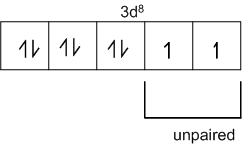 Multiple Choice Questions
Multiple Choice QuestionsCH3-CHCl-CH2-CH3 has a chiral centre. Which one of the following represents its R configuration?




The d-electron configuration of Cr3+, Mn2+, Fe2+ and Ni2+ are 3d4, 3d5, 3d6 and 3d8 respectively. Which one of the following aqua complexes will exhibit the minimum paramagnetic behaviour?
(At. no. Cr = 24, Mn = 25, Fe = 26, Ni = 28)
[Mn(H2O)6]2+
[Fe(H2O)6]2+
[Ni(H2O)6]2+
[Ni(H2O)6]2+
In which of the following pairs are both the ions coloured in aqueous solution?
(At. no.: Sc = 21, Ti = 22, Ni = 28, Cu = 29, Co = 2)
Ni2+, Ti3+
Sc3+, Ti3+
Sc3+,Co2+
Sc3+,Co2+
A.
Ni2+, Ti3+
Ni28 = 1s2s, 2s2, 2p6, 3s2,3p6,3d8,4s2
Ni2+ = 1s2, 2s2, 2p6, 3s2,3p6,3d8
Ti22 = 1s2,2s2, 2p6, 3s2,3p6,3d2,4s2
Which of the following is not chiral
2-butanol
2,3 -dibromo pentane
3- bromopentane
3- bromopentane
[Co(NH3)4(NO2)2]Cl exhibits:
linkage isomerism, ionisation isomerism and optical isomerism
Linkage isomerism, ionisation isomerism and geometrical isomerism
ionization isomerism, geometrical isomerism and optical isomerism
ionization isomerism, geometrical isomerism and optical isomerism
[Cr(H2O)6]Cl3 (at. no. of Cr = 24) has a magnetic moment of 3.83 BM, the correct distribution of 3d electrons in the chromium of the complex is:




The number of unpaired electrons in a paramagnetic diatomic molecule of an element with atomic number 6 is:
2
3
4
4
An example of a sigma bonded organometallic compound is :
Ruthenocene
Grignard's reagent
Ferrocene
Ferrocene
The correct order of the stoichiometries of AgCl formed when AgNO3 in excess is treated with the complexes: CoCl3.6NH3, CoCl3.5NH3, CoCl3.4NH3 respectively is
1 AgCl, 3 AgCl, 2 AgCl
3 AgCl, 1 AgCl, 2 AgCl
3 AgCl, 2 AgCl, 1 AgCl
3 AgCl, 2 AgCl, 1 AgCl
Correct increasing order for the wavelengths of absorption in the visible region for the complexes of Co3+ is
[Co(en)3]3+, [Co(NH3)6]3+, [Co(H2O)6]3+
[Co(H2O)6]3+, [Co(en)3]3+, [Co(NH3)6]3+
[Co(H2O)6]3+, [Co(NH3)6]3+, [Co(en)3]3+
[Co(H2O)6]3+, [Co(NH3)6]3+, [Co(en)3]3+
